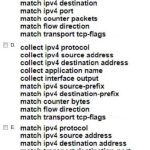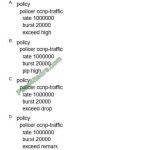Studying for Cisco 200-155 dumps exam? “Introducing Cisco Data Center Technologies” is the name of Cisco 200-155 exam dumps which covers all the knowledge points of the real Cisco exam. Download 100% pass rate CCNA Data Center DCICT 200-155 dumps free study guides youtube with the knowledge and skills. Pass4itsure Cisco 200-155 dumps exam questions answers are updated (85 Q&As) are verified by experts.
The associated certifications of 200-155 dumps is CCNA Data Center. These are the many Cisco 200-155 sample questions that have got so many questions related to Cisco Introducing Cisco Data Center Technologies test for the better preparation of CCNA Data Center https://www.pass4itsure.com/200-155.html dumps exam questions.
Exam Code: 200-155
Exam Name: Introducing Cisco Data Center Technologies
Q&As: 85
[100% Vaild Cisco 200-155 Dumps From Google Drive]: https://drive.google.com/open?id=0BwxjZr-ZDwwWNHFtR0VqbXVEeUU
[100% Vaild Cisco 210-260 Dumps From Google Drive]: https://drive.google.com/open?id=0BwxjZr-ZDwwWU0xad3NvRWR4Qzg

Pass4itsure Latest and Most Accurate Cisco 200-155 Dumps Exam Q&As:
UESTION NO: 50
What happens when you attempt to compile and run the following code?
#include <vector>
#include <set>
#include <iostream>
#include <algorithm>
using namespace std;
void print(int v) { cout<<v<<” “; }
struct Sequence {
int start;
Sequence(int start):start(start){}
int operator()() { return start++; }
};
bool predicate(int v) { return v%2==0; }
int main() {
vector<int> v1(10);
generate_n(v1.begin(), 10, Sequence(1));
set<int> s1(v1.begin(), v1.end());
remove_if(s1.begin(), s1.end(), predicate);
for_each(s1.begin(), s1.end(), print);cout<<endl;
return 0;
}
Program outputs:
A. 1 3 5 7 9 6 7 8 9 10
B. 1 3 5 7 9
C. 2 4 6 8 10
D. compilation error
200-155 exam Answer: D
QUESTION NO: 51
What happens when you attempt to compile and run the following code?
#include <string>
#include <list>
#include <iostream>
using namespace std;
template<class T> void print(T start, T end) {
while (start != end) {
std::cout << *start << ” “; start++;
}
}
int main() {
string t1[] ={ “1”, “2”, “3”, “4”, “5”, “6”, “7”, “8”, “9”, “10”};
list<string> l1(t1, t1 + 10);
list<string> l2(l1);
l2.reverse(); l1.splice(l1.end(),l2);
l1.unique();
print(l1.begin(), l1.end()); cout<<endl;
return 0;
}
A. compilation error
B. program outputs: 1 2 3 4 5 6 7 8 9 10 9 8 7 6 5 4 3 2 1
C. program outputs: 1 2 3 4 5 6 7 8 9 10 10 9 8 7 6 5 4 3 2 1
D. program outputs: 1 2 3 4 5 6 7 8 9 10
Answer: B
QUESTION NO: 52
What happens when you attempt to compile and run the following code?
#include <iostream>
#include <algorithm>
#include <vector>
using namespace std;
int main () {
int t[] = {1,2,3,4,5,1,2,3,5,4};
vector<int> v (t,t+10);
vector<int>::iterator it;
int m1[] = {1, 3, 2};
it = find_end (v.begin(), v.end(), m1, m1+3);
if (it != v.end())
cout << “Found at position: ” << it?v.begin() << endl;
return 0;
}
A. program outputs: Found at position: 5
B. program outputs: Found at position: 0
C. no output
D. program outputs: Found at position: 10
200-155 dumps Answer: C
QUESTION NO: 53
What will happen when you attempt to compile and run the code below, assuming that file test.in
contains the following sequence: 1 2 3?
#include <iostream>
#include <fstream>
#include <string>
#include <list>
#include <algorithm>
using namespace std;
template<class T>struct Out {
ostream & out;
Out(ostream & o): out(o){}
void operator() (const T & val ) {out<<val<<” “; } };
int main () {
ifstream f(“test.in”);
list<int> l;
for( ; f.good() ; ) {
int i;
f>>i;
l.push_back(i);
}
f.close();
for_each(l.begin(), l.end(), Out<int>(cout));
return 0;
}
Program will output:
A. 1 2 3
B. 1 2 3 3
C. no output
D. compilation error
E. program runs forever without output
Answer: A
QUESTION NO: 54
What happens when you attempt to compile and run the following code?
#include <vector>
#include <iostream>
int main ()
{
int t[]={1,2,3,4,5};
std::vector<int>v1(t,t+5);
std::vector<int>v2(v1);
v1.resize(10);
v2.reserve(10);
std::vector<int>::iterator i = v1.begin();int ii = 0;
while (i != v1.end()) { std::cout<<i[ii]<<” “;ii??;i++; }
i = v2.begin();ii=0;
while (i != v2.end()) { std::cout<<i[ii]<<” “;ii??;i++; }
return 0;
}
A. program outputs 1 1 1 1 1 1 1 1 1 1 1 1 1 1 1
B. compilation error
C. program outputs 1 1 1 1 1 1 1 1 1 1 1 2 3 4 5
D. program outputs 1 2 3 4 5 0 0 0 0 0 1 2 3 4 5 0 0 0 0 0
200-155 pdf Answer: A
QUESTION NO: 55
What will happen when you attempt to compile and run the following code?
#include <iostream>
using namespace std;
template <class T>
class A {
T_v;
public:
A(T v);
};
template<class T>
A. :A(T v):_v(v) {}
int main()
{
A<int> a(2);
cout<<1<<endl;
return 0;
}
B. program will display: 1
C. program will not compile
D. program will compile
E. program will cause runtime exception
Answer: B
QUESTION NO: 56
What happens when you attempt to compile and run the following code?
#include <vector>
#include <iostream>
#include <algorithm>
#include <functional>
using namespace std;
template<class T>struct Out {
ostream & out;
Out(ostream & o): out(o){}
void operator() (const T & val ) { out<<val<<” “; } };
int main() {
int t1[]={1,2,3,4,5,6,7,8,9,10};
int t2[]={1,2,3,4,5,6,7,8,9,10};
vector<int> v1(t1, t1+10);
vector<int> v2(t2, t2+10);
vector<int> v3(10);
transform(v1.begin(), v1.end(), v2.rbegin(), v3.begin(), minus<int>());
for_each(v3.rbegin(), v3.rend(), Out<int>(cout));cout<<endl;
return 0;
}
Program outputs:
A. 9 7 5 3 1 ?1 ?3 ?5 ?7 ?9
B. ?1 ?3 ?5 ?7 ?9 9 7 5 3 1
C. 1 3 5 7 9 ?1 ?3 ?5 ?7 ?9
D. 1 3 5 7 9 ?1 ?3 ?5 ?7 ?9
E. ?9 ?7 ?5 ?3 ?1 1 3 5 7 9
200-155 vce Answer: A
QUESTION NO: 57
What happens when you attempt to compile and run the following code?
#include <vector>
#include <iostream>
#include <algorithm>
#include <functional>
using namespace std;
template<class T>struct Out {
ostream & out;
Out(ostream & o): out(o){}
void operator() (const T & val ) { out<<val<<” “; } };
struct Add : public binary_function<int, int, int> {
int operator() (const int & a, const int & b) const {
return a+b;
}
};
int main() {
int t[]={1,2,3,4,5,6,7,8,9,10};
vector<int> v1(t, t+10);
vector<int> v2(10);
transform(v1.begin(), v1.end(), v2.begin(), bind1st(Add(), 1));
for_each(v2.rbegin(), v2.rend(), Out<int>(cout));cout<<endl;
return 0;
}
Program outputs:
A. 1 2 3 4 5 6 7 8 9 10
B. 2 3 4 5 6 7 8 9 10 11
C. 10 9 8 7 6 5 4 3 2 1
D. 11 10 9 8 7 6 5 4 3 2
E. compilation error
Answer: D
QUESTION NO: 58
Which changes introduced independently will allow the code to compile and display “one” “eight”
“nine” “ten”? Choose all that apply.
#include <iostream>
#include <map>
#include <string>
using namespace std;
class A {
int a;
public:
A(int a):a(a){}
int getA() const { return a;}
/* Insert Code Here 1 */
};
/* Insert Code Here 2 */
int main(){
int t[] ={ 3, 4, 2, 1, 6, 5, 7, 9, 8, 10 };
string s[] = {“three”, “four”, “two”, “one”, “six”,”five”, “seven”, “nine”,”eight”,”ten”};
multimap<A,string> m;/* Replace Code Here 3 */
for(int i=0; i<10; i++) {
m.insert(pair<A,string>(A(t[i]),s[i]));
}
m.erase(m.lower_bound(2),m.upper_bound(7));
multimap<A, string>::iterator i=m.begin();/* Replace Code Here 4 */
for( ; i!= m.end(); i++) {
cout<<i?>second<<” “;
}
cout<<endl;
return 0;
}
A. operator int() const { return a;} inserted at Place 1
B. bool operator < (const A & b) const { return a<b.a;} inserted at Place 1
C. bool operator < (const A & b) const { return b.a<a;} inserted at Place 1
D. struct R { bool operator ()(const A & a, const A & b) { return a.getA()<b.getA();} }; inserted at
Place 2
replacing line marked 3 with multimap<A, string, R> m;
replacong line marked 4 with multimap<A, string, R>::iterator i=m.begin();
200-155 exam Answer: A,B,D
QUESTION NO: 59
What happens when you attempt to compile and run the following code?
#include <iostream>
#include <algorithm>
#include <map>
using namespace std;
int main() {
int t[] = { 10, 5, 9, 6, 2, 4, 7, 8, 3, 1 };
map<int, int> m;
for(int i=0; i < 10; i++) {
m[i]=t[i];
}
map<int, int>::iterator it = find(m.begin(), m.end(), 5);
cout<<it?>first;
return 0;
}
Program outputs:
A. 5
B. 4
C. 10
D. compilation error
Answer: D
QUESTION NO: 60
What happens when you attempt to compile and run the following code? Choose all that apply.
#include <iostream>
#include <fstream>
#include <string>
#include <list>
#include <algorithm>
#include <iomanip>
using namespace std;
template<class T>struct Out {
ostream & out;
Out(ostream & o): out(o){}
void operator() (const T & val ) {out<<setw(3)<<hex<<val; } };
int main () {
int t[] = {1, 2, 3, 4, 5, 6, 7, 8, 9, 10};
fstream f(“test.out”, ios::trunc|ios::out);
list<int> l(t, t+10);
for_each(l.begin(), l.end(), Out<int>(f));
f.close(); f.open(“test.out”);
for( ; f.good() ; ) {
int i; f>>i;
cout<<i<<” “;
}
f.close();
return 0;
}
A. file test.out will be opened writing
B. file test.out will be truncated
C. file test.out will be opened for reading
D. no file will be created nor opened
E. program will display sequence 1 2 3 4 5 6 7 8 9 10
200-155 dumps Answer: A,B,C,E
QUESTION NO: 61
What happens when you attempt to compile and run the following code?
#include <iostream>
#include <string
using namespace std;
template <class T>
class A {
T_v;
public:
A() {}
A(T v): _v(v){}
T getV() { return _v; }
void add(T & a) { _v+=a; }
void add(string & a) {
_v.insert(0, a);
}
};
int main()
{
A<string>a(“Hello”);
string s(” world!”);
a.add(s);
cout << a.getV() <<endl;
return 0;
}
A. program will display: Hello world!
B. compilation error
C. program will display: world!Hello
D. program will run without any output
Answer: B
Pass4itsure can solve as many Cisco 200-155 dumps new questions as they want, so that they can get perfect for https://www.pass4itsure.com/200-155.html dumps exams before getting in any kind of trouble.


